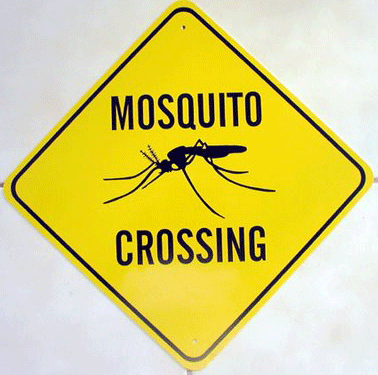The Loop
Fitness Friday: Mosquitoes might be a matter of life and death
*Every week my colleague Ron Kaspriske, Golf Digest Fitness Editor, presents Fitness Friday on the Instruction Blog. This week he discusses something that threatens many of us in the warmer months on golf courses--mosquito bites. It's not just annoying; it's more serious than you might think. Look for Weekend Tip tomorrow, and remember to follow me on Twitter: @RogerSchiffman**.
Roger Schiffman
Managing Editor
Golf Digest

Here's Ron: Everywhere from Arizona to Idaho to Ohio, confirmed cases of West Nile Virus are being reported this summer. The disease, which can be deadly, is transmitted to the body through a mosquito bite.
That is bad news for golfers, especially those who play early-morning or late-afternoon rounds when mosquitoes are the most active. According to the Centers for Disease Control and Prevention (CDC), mosquitoes carry the largest doses of the virus in late summer and early fall, which is why it's time for a refresher on wearing insect repellent.
Female mosquitoes bite because they need the protein found in your blood to help develop their eggs and make, yup, more mosquitoes. They are attracted to you by body odor and carbon dioxide from your breath. The best repellents, the ones with DEET or Picaridin, make your skin unappealing to mosquitoes and many other species of insects. Keep in mind that these repellents don't kill mosquitoes, so while they might not be biting you, they'll still be around. When shopping for a repellent, make sure it has DEET or Picaridin. The higher the concentration of these active ingredients, the longer the protection they provide. For example, a product with 20 percent DEET provides almost four hours of protection, or just about enough to get you through a round of golf without reapplying.
If you don't like the idea of absorbing chemicals and other artificial ingredients into your skin, another natural repellent that the CDC says offers decent protection is oil of lemon eucalyptus. This natural plant byproduct is registered with the Environmental Protection Agency and is comparable to a low dose of DEET, so it needs to be reapplied more than once during a round of golf.
A few more things to consider: Do not use sunscreens that also contain
DEET. The biggest reason is that the application process and reapplication times often differ between the sunscreen and the bug repellent. If you use a repellent with the active ingredient permethrin, do not apply directly to your skin. Use it only for your clothing.
According to various government agencies, repellents are OK to be used on children, though eucalyptus oil should not be used on kids three or younger and DEET should not be used on infants two months or younger.
Some people, including experts, are skeptical about DEET in general. If you don't want to use any repellent, some golfers, like those at Sea Island, Ga., make liberal use of Skin So Soft, a scented body oil, which also is effective in repelling those pesky little flies called No See 'ems.
In addition, you might try covering your skin with thick-thread clothing and breathe less. Ha!
*Ron Kaspriske
Fitness Editor
Golf Digest*